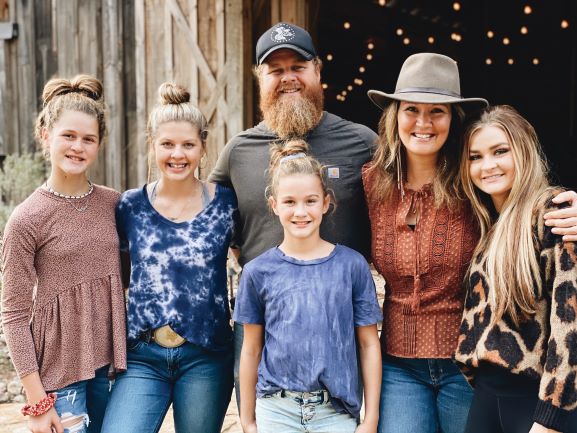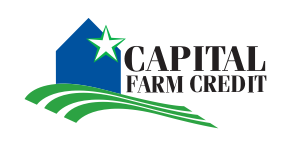Hither and Yon

Yonder Way Farm produces pasture-raised meat and eggs, and covers miles of Texas to deliver directly to its customers
On St. Patrick’s Day, 2020, Jason and Lynsey Kramer knew something was going on when their phones wouldn’t stop ringing.“Grocery stores were running out of food — especially meat, because they were shutting down packing plants,” Lynsey says. “People were really scared.”
But there was plenty of meat in the freezer and on the hoof at Yonder Way Farm, the small Texas farm they financed with Capital Farm Credit. After all, they and their four daughters produce enough grass-fed beef, pastured pork, chicken and eggs every year to feed about 500 families.
Meeting an urgent need
The Kramers sell directly to retail customers, offering a wide variety of products they source from nearby farms. They’ve always believed small farms can make a big difference. And for them, the COVID-19 pandemic was proof.
Ordinarily it was enough to do business five days a week — two at the farm store and three through deliveries in several cities. When sales tripled in spring 2020, things changed. Their store stayed open all day, every day for about three months.
“We’d have 80-100 cars in line to get in,” Jason says. “We have a great network of farms all around us, so every day we had bread, fresh vegetables and raw dairy coming in. We were rocking and rolling.”
They also supply three restaurants and a top-rated culinary school. When those closed, the Kramers didn’t miss a beat.
“Last year was hard for a lot of farms that just do wholesale and had nowhere to go with product,” Jason says. “Our wholesale suffered but our retail grew. People just needed food.”
Discovering health and fulfillment
The Kramers haven’t always been farmers. In the mid-2000s, Jason was a Houston firefighter and Lynsey was a stay-at-home mom with a photography business.
After developing some health problems, they started thinking about what they were eating. Soon they were driving to farms to buy produce and ordering meat from a ranch.
“Our health crisis gave us a love for food — not just the way it tastes, but also being the first step in preventive maintenance,” Jason says.
So when relatives moved to the country in 2005 and asked Jason and Lynsey to manage their property, the couple jumped at the chance.
First they put in a garden and bought some chickens for eggs. Next came a few pigs and cattle. And Yonder Way Farm was born.
“We fell in love with growing our own food,” Lynsey says. “We felt really fulfilled.”
It was so satisfying, they made farming a full-time family business.
Creating a community through food
Over time, Yonder Way Farm developed loyal customers who were also interested in food and health. Best of all, their customers prepaid and the Kramers delivered.
“We wanted to distribute our food directly from our hands to the hands of our customers,” Lynsey says. “We wanted to source as many local foods as possible. And we really wanted to be in control of the whole process from the beginning to the end and create a community through food.”
In 2012, the Kramers wanted to put down roots on their very own farm. It felt like a miracle to find everything they wanted just down the road — nearly 40 acres, a charming 1906 farmhouse, an 1800s barn and even a store.
De-modernizing the farm
Soon the Fayetteville place was like an old farmstead again. Pasture-raised chickens fertilize the fields, so there’s no need for chemicals. And heritage-breed hogs rotate through the pastures. For their hogs, Jason chose a three-way cross that has excellent marbling and does well outside.
“We’ve kind of de-modernized it,” Jason says. “We put the animals in the environment they would naturally be in. They can be active and move around.
“There’s going to be a slower growth process. But an active, healthy animal is a good thing to eat. The meat is firm and has visible muscles.”
For their grass-fed, grass-finished beef, they lease 4,000 acres, also free of chemical fertilizers and herbicides.
Financing with the right fit
The move to Fayetteville led the Kramers to Capital Farm Credit. Jason appreciated how it understands agriculture and didn’t want a balloon payment like other lenders.
“More than anything, it’s nice having those co-op dividend checks,” he says. “It’s like I have fewer payments a year because they give me money back. Rolling that into some other project is beneficial in farming.”
Tim Knesek, Capital’s Houston market president, is happy to see the Kramers do well. He says the rural way of life attracts similar families more than ever.
“There was a time when rural living meant having a garden and your own fresh grass-fed beef and farm-raised eggs,” he says. “The COVID-19 pandemic certainly has increased the desire for city dwellers and others to reconnect with rural America. Yonder Way Farm has been visionary in positioning the business to provide wholesome foods and experiences people are looking for.”
And there’s room for more agricultural producers, the Kramers say.
“There’s no way a farm like ours can feed the masses,” Lynsey says. “But if there were more small farms like us, I feel that would benefit people. Honestly, it’s hard to keep up with the demand for our meat and eggs.”
Finding ways to connect
To share the joy of local, seasonal food, the Kramers started a supper club three years ago and hosted dinners for up to 150 people. They had to suspend group meals temporarily due to the pandemic. But they still post recipes, photos and family stories online and on Instagram.
“Marketing for us is just sharing our daily journey,” says Lynsey, who has over 80,000 Instagram followers. “I can post a beautiful picture and keep people connected to what’s going on at the farm. I had no idea we would grow far beyond our customers on social media. People are so interested in what we do.”
And after growing sales at least 70% since before the pandemic, they just moved their store to the historic Fayetteville town square.
Launching a family legacy
But the most rewarding part is doing everything as a family — from tending animals to scheduling orders and serving customers.
“It’s been incredible,” Lynsey says. “Our girls have definitely become independent, resilient and business savvy through being a part of what we do.”
The Kramers will tell you it’s hard work that never feels like a job.
“We were steered this way through the health benefits, but it transcended that,” Jason says. “We’re provided for and life isn’t just about existing, it’s full of adventure.”
